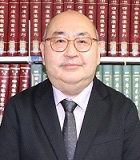所長あいさつ Message

(関西大学東西学術研究所長)
関西大学東西学術研究所は1951年(昭和26年)4月に設立され、昨年(2021年)70周年を迎えました。今や東西学術研究のメッカとして世界にその名を知られているといってもいいでしょう。
今日でこそ学問の越境や学際的研究が声高に叫ばれるようになっていますが、設立当初から「東西両洋文化の学術研究、殊に比較研究を行い、世界文化の融合に貢献する」という高い理念を掲げた本研究所は、まさに今日的学知のあり方を先どりしてきたといえます。ここには東西にわたる広範な視野、一国主義に陥らない複合的な見方、異文化間交流に着目する柔軟な視点、そこに通底する共生的理念があります。そして、その一つの形が具現化されたのが、「文化交渉学」という新しい学問体系の構築を目指したグローバルCOEプログラム(2007-12年)であり、私立大学戦略的研究基盤形成支援事業に採択された「アジア文化研究センター」(CSACII、2011-16年)でした。これらはともに本研究所のもとに設けられて大きな成果を挙げ、国内外から高い評価を得たところです。
この延長線上に2017年(平成29年)4月、私立大学研究ブランディング採択事業として「関西大学アジア・オープン・リサーチセンター」(KU-ORCAS)が設立されました。東アジアのデジタルアーカイブ構築と発信を推進した当センターは5年間の活動を経て、今年(2022年)4月、本研究所附属の常設研究拠点として再出発しました。今後は既存の人文学研究とともに、デジタル人文学が新たな体制のもとに目指されることになります。
現在、本研究所は5研究班、KU-ORCASは2研究班の体制をとり、それぞれの課題のもとに幅広い研究活動を展開しています。①研究、調査およびその成果の発表、②研究例会・講演会・シンポジウムの開催、③外国人研究者の受け入れなどの活動です。
研究員は本学の専任教員のほか、委嘱研究員・客員研究員・非常勤研究員として外部研究者に参画していただくとともに、多くの海外研究機関とネットワークで結ぶこと研究分野の開拓に注力するとともに、対外的発信力を高めています。また若手研究者の養成にも力を入れ、準研究員制度を設けて大学院生の研究能力の向上に努めています。
本研究所の研究成果としては、学術論文が『関西大学東西学術研究所紀要』(2022年に第55輯を刊行)に毎年掲載されるほか、各研究者の研究成果を集成した研究叢刊(同69冊)、訳注シリーズ(同21冊)、資料集刊(同92冊)、索引シリーズ(同1冊)、国際共同研究シリーズ(同10冊)、東西学術研究所研究叢書(同17冊)などの刊行があります。これほど多くの成果を継続的に挙げている研究所は国内でも稀であり、まさに私どもの誇りとするところです。
このほか、大阪の著名な漢学塾「泊園書院」の蔵書約1万6千余冊が寄贈されたことが機縁となって1961年(昭和36年)、本研究所内に泊園記念会が設けられました。毎年秋に市民講座として開催される「泊園記念講座」はすでに60回を数え、雑誌『泊園』も61号を刊行しています。
このように、当研究所は70年にわたって活動を展開し、多くの実績を蓄積してきました。ただし、取り組むべき領域はなお多く、グローバル化やデジタル化などの時代的要請に応える必要もいっそう増しています。今後とも大方のご理解、ご支援を得てさらなる変革と発展を期したいと考える次第です。
The Institute of Oriental and Occidental Studies at Kansai University, which was established in April 1951, celebrated its 70th anniversary last year (2021). Today, the Institute is known worldwide as a hub for East-West academic research.
Nowadays, cross-disciplinary and interdisciplinary research have come to be in high demand, but ever since its foundation, the Institute has held the high ideal of “conducting academic research on both Eastern and Western cultures, with a focus on comparative research, and contributing to the fusion of world cultures,” thus truly anticipating contemporary principles of academic knowledge. The result is a broad perspective that spans East to West, multifaceted viewpoints that avoid monoculturalism, a flexible perspective focusing on intercultural exchange, and a symbiotic philosophy that underlies all of this.
These principles were embodied in the Global COE Program (2007–12), which aimed to build a new academic system called “Cultural Interaction Studies,” and the Center for the Study of Asian Cultures (CSACII, 2011–16), which was selected as a MEXT-Supported Program for the Strategic Research Foundation at Private Universities project. Both of these projects have been established under the Institute and have achieved significant results, receiving high domestic and international acclaim.
As an extension of these projects, in April 2017, the Kansai University Open Research Center for Asian Studies (KU-ORCAS) was established as a private university research branding project. After five years of activities, this Center, which promotes the construction and dissemination of digital archives in East Asia, was relaunched in April 2022 as a permanent research center attached to this Institute. In the future, to complement our existing humanities research, digital humanities will be added.
The current system of the Institute comprises five research groups and two research groups under KU-ORCAS, which are developing a wide range of research activities in their respective fields. These activities include (1) research, surveys, and presentations of results, (2) regular research meetings, lectures, and symposia, and (3) hosting foreign researchers.
Besides our full-time faculty members, we invite outside researchers to participate as contract researchers, visiting researchers, and part-time researchers, and we are also networking with many overseas research institutions to develop research fields and enhance our ability to communicate our findings to the outside world. We also endeavor to train young researchers and establish a student research assistant system to enhance the research abilities of graduate students.
In addition to publishing academic papers in the annual Bulletin of the Institute of Oriental and Occidental Studies at Kansai University (which has reached its 55th edition as of 2022), we make available the findings of individual researchers in the Research Series (69th edition), the Translation Series (21st edition), the Source Material Collections (92th edition), the Index Series (1st edition), the International Joint Research Series (10th edition), and the Oriental and Occidental Studies Series (17th edition). It is rare for a research institute in Japan to continuously achieve such a large number of results, and we are truly proud of that.
On another front, the Institute received a donation of approximately 16,000 volumes from the collection of Hakuen Shoin, a famous private school for the study of Chinese classics in Osaka, which led to the establishment of the Hakuen Memorial Society in 1961. We hold the Hakuen Memorial Course every fall, which has been conducted 60 times to date, and we have published 61 issues of the Hakuen magazine as well.
In this way, we have pursued our mission for 70 years, resulting in significant achievements. However, we are conscious that there are still many areas of investigation to be addressed, even as the need to respond to contemporary issues, such as globalization and digitalization, is ever increasing. With your understanding and support, we look forward to achieving further growth and development in the future.




